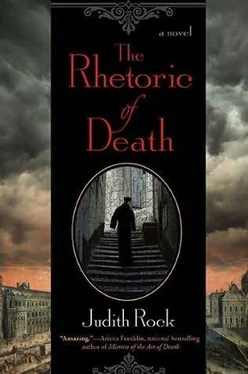Judith Rock - The Rhetoric of Death
Здесь есть возможность читать онлайн «Judith Rock - The Rhetoric of Death» весь текст электронной книги совершенно бесплатно (целиком полную версию без сокращений). В некоторых случаях можно слушать аудио, скачать через торрент в формате fb2 и присутствует краткое содержание. Жанр: Исторический детектив, на английском языке. Описание произведения, (предисловие) а так же отзывы посетителей доступны на портале библиотеки ЛибКат.
- Название:The Rhetoric of Death
- Автор:
- Жанр:
- Год:неизвестен
- ISBN:нет данных
- Рейтинг книги:3 / 5. Голосов: 1
-
Избранное:Добавить в избранное
- Отзывы:
-
Ваша оценка:
- 60
- 1
- 2
- 3
- 4
- 5
The Rhetoric of Death: краткое содержание, описание и аннотация
Предлагаем к чтению аннотацию, описание, краткое содержание или предисловие (зависит от того, что написал сам автор книги «The Rhetoric of Death»). Если вы не нашли необходимую информацию о книге — напишите в комментариях, мы постараемся отыскать её.
The Rhetoric of Death — читать онлайн бесплатно полную книгу (весь текст) целиком
Ниже представлен текст книги, разбитый по страницам. Система сохранения места последней прочитанной страницы, позволяет с удобством читать онлайн бесплатно книгу «The Rhetoric of Death», без необходимости каждый раз заново искать на чём Вы остановились. Поставьте закладку, и сможете в любой момент перейти на страницу, на которой закончили чтение.
Интервал:
Закладка:
Though Jouvancy’s Latin was a delight to the ear, Charles was finding that he disliked the tragedy’s story even more than the ballet’s livret. Clovis/Louis waged war everywhere, killing and looting, regardless of treaties or anything else except his own will and craving for glory. Then Clovis married a Christian, who was, of course, an allegory for Louis’s devout second wife, Mme de Maintenon. On the brink of defeat in battle, Clovis-here recalling the emperor Constantine-prayed to the Christian God for victory, got it, and was baptized, along with three thousand of his pagan warriors. Thus uniting his realm in “the most perfect religious and patriotic harmony,” as Louis had supposedly done in revoking the Edict of Nantes.
Charles called a break. The actors broke into small, chattering groups, flinging themselves to the floor to rest or helping themselves from the pitchers of water standing ready on a table. Charles answered a few questions, gave suggestions and corrections, and withdrew to the windows. For a miracle, it was another warm day and the courtyard was bathed in sunshine. He leaned out and, squinting up at the cluster of sundials engraved on the south-facing observatory tower, figured that the rehearsal had three-quarters of an hour yet to go. When he looked back at the courtyard, Pere Jouvancy was hurrying across it. Charles went to the classroom door to meet him.
“Welcome back, mon pere! Did you have any luck at the college house in Gentilly?”
“None. I have just been with the rector, who has called in Lieutenant-General La Reynie. He is the head of our police.” A brief smile lit Jouvancy’s tired face. “I have also seen Antoine. Who is ravenously hungry, his usual state, and the best of signs, thank God.”
“Thank God indeed!”
“Now. Tell me what you and M. Beauchamps have done here and I will take over. Pere Le Picart wants to see you.”
“Me? Now?”
“Yes, and you must not keep him waiting.”
Charles gave a brief report, ending with the chiming clock situation and leaving Jouvancy stifling laughter. Charles crunched across the gravel’s white glare, hoping that this summons didn’t mean that last night’s eavesdropping had been found out. As he entered the grand salon, off which the rector’s study opened, a tall, powerfully built man, no longer young but still an imposing presence, emerged from the study and shut the door behind him. He nodded to Charles and strode across the salon toward the street passage. Charles tapped on the rector’s door.
“Come,” Pere Le Picart called, and Charles stepped into a cool, east-facing room with a high-beamed ceiling and a silky carpet in faded reds and greens on the worn wide-boarded floor. The one small casement of old, green-tinged glass stood open to the courtyard, letting in the sounds of passing feet, an occasional burst of chatter, and the faint noise of street traffic.
Charles bowed. Le Picart rose from the chair behind his desk and gestured Charles to one of a pair of chairs beside the empty fireplace.
“A little wine, Maitre du Luc?” He picked up the pottery pitcher on the table between the chairs, poured pale red wine into the waiting cone-shaped glasses, and sat down facing Charles.
“Thank you, mon pere.”
Though watered as usual, the wine was welcome on a hot afternoon. As they sipped, Charles studied the rector. Le Picart’s lean face was lined and strongly boned, his short thick hair was gray, and traces of peasant Normandy lingered in his voice.
As though he’d heard what Charles was thinking, he smiled over his glass and said, “This time of year at home, we’re starting to think of cider. My village is on the edge of Normandy, and my father had an orchard with good Norman apple trees.”
“I am fond of cider, too, mon pere. My mother comes from Normandy.”
“Ah. I wondered. Most from the south are dark, but you have the true look of the old North raiders. How did your parents meet?”
“They met at court, at Fontainebleau. My mother was one of the Dowager Queen’s ladies and my father was making his brief and only effort to improve his fortunes by gaining the court’s notice. When I was little”-Charles laughed-“she used to tease my father, who was shorter and darker, and say that no one would believe I was his child. And he would tease her back, and say, ‘whose, then, wench?’ And we would all fall down laughing.”
“They must have been close, your father and mother! Not many men will be teased in that way.”
“Yes, they were close. We all were.”
“You were a happy child, then.” Le Picart smiled a little sadly. “Children. They should all be happy. Well, at least our Antoine is recovering. But you probably know that Philippe is still missing. The man who left just before you arrived is Nicolas de La Reynie, our Lieutenant-General of police. I have asked him to search for Philippe. Which is why I have taken you away from your rehearsal.” The rector stared into the empty fireplace for a moment and then fixed Charles with a measuring look. “Mme LeClerc has been to see me, Maitre du Luc. It seems you left Pere Guise out of your story.”
Charles sipped his wine to give himself a moment to think. “Yes, mon pere, I did.”
“Why?”
“She obviously dislikes him and-it seemed better to say nothing.”
“Describe for me exactly what you saw Pere Guise do.”
“I saw him talking to a street porter. Mme LeClerc was watching them when I arrived. The porter seemed uneasy. I did not see Pere Guise give the man money. Though I was not there all the time they talked.”
“Did you speak with the porter yourself?”
“He was gone before I could.”
“And what do you think now of Mme LeClerc’s story?”
Gazing into his glass, Charles searched his impressions of the baker’s wife. “On the whole, I believe her.” He lifted his gaze to the rector. “Her anger at the horseman and her concern for Antoine were very convincing. And her bluntness. As I said in the infirmary, I wondered about the mask, though. And about her dislike of Pere Guise.” Charles smiled ruefully. “Many people are rude about priests, but usually not to the priest’s face.”
“True. You should know that Pere Guise has sometimes taken it on himself to chastise the few shopkeepers who still rent space in our building’s frontage for what he considers infractions of our rules. He has also clashed with Mme LeClerc over her small daughter, who has once or twice been found in our stable.”
“Ah,” Charles said, suddenly remembering the little girl in front of the baker’s shop the day Antoine was hurt.
For a moment Le Picart’s eyes had what Charles could only call a wicked gleam. “Mme LeClerc is one of the few people who has ever bested Pere Guise, at least in volume.” He lifted an eyebrow at Charles. “The college is not Eden, Maitre du Luc. Though some of us might think so, if we had only the one serpent.”
Charles laughed outright, liking this rector more and more.
“So,” Le Picart said. “I called you here because you are obviously taking an interest in what has happened to Antoine and Philippe, and I want you to understand some things. I am going somewhat beyond my writ in what I am about to say. Which you are to treat in the strictest confidence.”
“Of course, mon pere.”
“Pere Guise has already been to see me about you. About your heretical views.”
Charles went cold. He opened his mouth to defend himself but nothing came out. The rector held up a hand.
“Hear me out. The point-my point here, at least-is not your views, but Pere Guise’s. He is a brilliant man and a fiercely devoted priest. He is also a bad enemy. His fervor outruns his charity.” Le Picart sighed. “The Guise fire from the Wars of Religion still burns hot in him. You know, of course, that his great-grandfather more or less started the wars. And led the Catholic League, paid for its army, and nearly put a Guise on the throne of France. They are themselves royal in a minor way, springing as they do from the House of Lorraine. Sadly-or not, depending on your views-Pere Guise is the last male of his house. He pines for the lost Guise glory and seems to offer God a service of white-hot anger. I confess that I often do not know what to make of it. What God makes of it, I cannot imagine.”
Читать дальшеИнтервал:
Закладка:
Похожие книги на «The Rhetoric of Death»
Представляем Вашему вниманию похожие книги на «The Rhetoric of Death» списком для выбора. Мы отобрали схожую по названию и смыслу литературу в надежде предоставить читателям больше вариантов отыскать новые, интересные, ещё непрочитанные произведения.
Обсуждение, отзывы о книге «The Rhetoric of Death» и просто собственные мнения читателей. Оставьте ваши комментарии, напишите, что Вы думаете о произведении, его смысле или главных героях. Укажите что конкретно понравилось, а что нет, и почему Вы так считаете.












